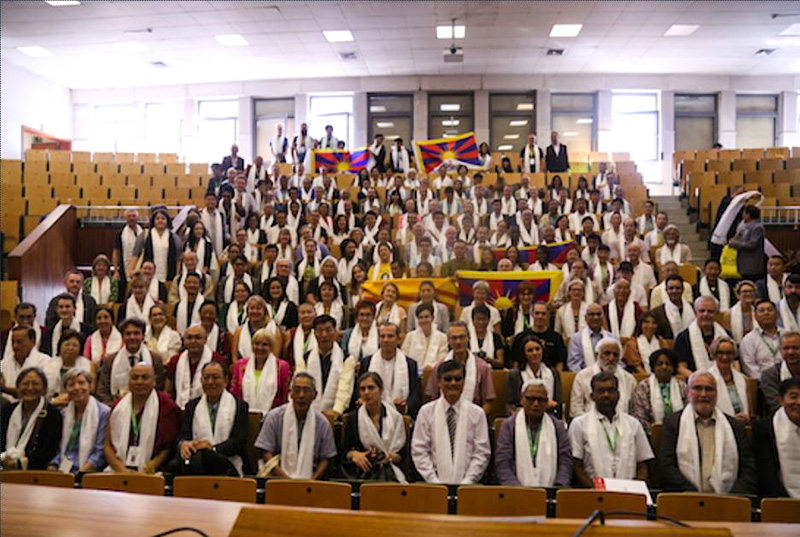
The Seventh International Conference of Tibet Support Groups, facilitated by the Department of Information and International Relations (DIIR) concludes three-day international conference in Brussels, the capital of European Union.
Over 250 delegates from 50 countries met to examine the current situation in Tibet, especially the political, human rights and environmental developments, and drew up plans for coordinated action to amplify the worldwide Tibet movement.
The delegates expressed its complete and continuing solidarity with the non-violent struggle of the Tibetan people for freedom and restoration of their fundamental human rights.
They also expressed great concern at the devastating impact of China's policies on Tibet's fragile and globally vital environment, notably the damming of Asia's rivers, destructive mining practices and coercive settlement of Tibetan pastoral nomads.
Placing the responsibility of the crisis in Tibet on China and their failed policies, the TSGs said the Chinese government should implement real changes in its policies and behavior towards the Tibetans and resume dialogue with Tibetan representatives to arrive at a mutually beneficial agreement.
They further called on governments and the international community to resist Chinese pressure to endorse China's claim to Tibet and urged them to persuade China's leaders to abandon the shameless precondition.
"We reaffirm our commitment to support His Holiness the Dalai Lama and the Central Tibetan Administration leadership's persistent call for earnest dialogue to resolve the Tibetan issue," the TSGs said.
"We will further strengthen our efforts to press the international community to persuade the Chinese leadership to resume dialogue and will continue our dedication until a satisfactory solution has been achieved," they added.
The three-day conference also outlined a series of Action Plans to be carefully considered and developed including joint and individual action by governments on violation of religious freedom, legal action in national courts on the basis of universal jurisdiction, action on language rights at the United Nations, list the 1959 Tibetan national uprising among the UNESCO's heritage of Memories of the World, to press all affected countries in particular the PRC to enter into a water-sharing agreement regarding the waters originating from the Tibetan plateau.
Increasingly, a number of Chinese delegates, including intellectuals are also attending the Special International Tibet Support Group Meetings from 8-10 September. The first International Conference of Tibet Support Groups was held in 1990 in Dharamshala,India, seat of the Central Tibetan Administration.
The Tibetan leadership in exile repeatedly said the MWA neither seeks a "Greater Tibet" nor a "high degree of autonomy", but "Genuine Autonomy" for all Tibetan people under a "single administration, to peacefully resolve the issue of Tibet and to bring about stability and co-existence between peoples based on equality and mutual co-operation. But, in its 2015 white paper, China again rejected the approach.
"The Tibetan leadership remains firmly committed to the MW policy, and strongly believes that only way to resolve the issue of Tibet is through dialogue," Dr Sangay who was re-elected as Sikyong, political leader of Tibetan people said during a two-day meeting of the Task Force on Sino-Tibetan Negotiations, recently held in Dharamshala, India.
Tibet was invaded by Communist China, starting in 1949, Beijing calls a "peaceful liberation". Since that time, over 1.2 million out of 6 Tibetans have been killed, over 6000 monasteries have been destroyed— the acts of murder, rape and arbitrary imprisonment, torture and cruel, inhuman and degrading treatment were inflicted on the Tibetans inside Tibet.
Tibet was traditionally comprised of three main areas— U-tsang, Kham and Amdo provinces, covers an area of 870,000 square miles. After 1949, other Tibetan areas (Amdo and Kham) were incorporated into the neighboring, Chinese provinces of Gansu, Qinghai, Sichuan, and Yunnan.


![Tibet has a rich history as a sovereign nation until the 1950s when it was invaded by China. [Photo: File]](/images/stories/Pics-2024/March/Tibet-Nation-1940s.jpg#joomlaImage://local-images/stories/Pics-2024/March/Tibet-Nation-1940s.jpg?width=1489&height=878)















